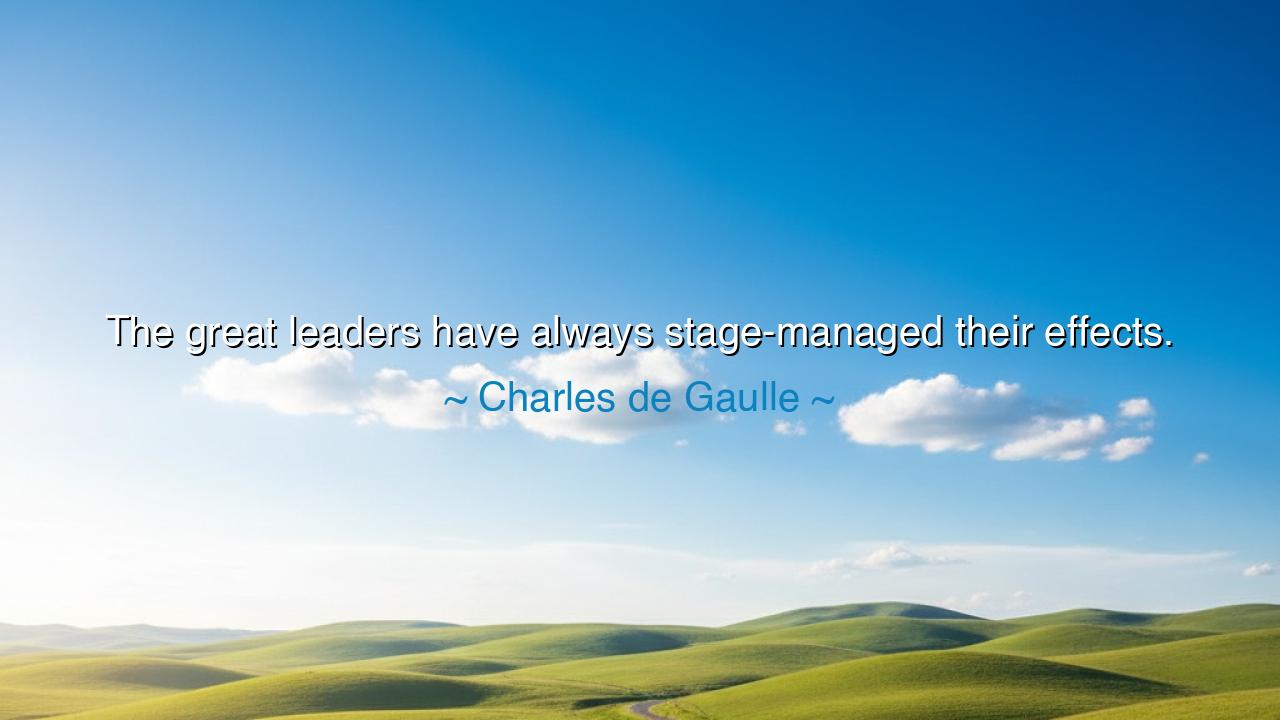
The great leaders have always stage-managed their effects.






“The great leaders have always stage-managed their effects.” — Charles de Gaulle
In these bold and unflinching words, Charles de Gaulle, the indomitable general and statesman of France, unveils a truth that few dare to speak aloud: that leadership is not only vision and courage—it is also theatre. He reminds us that those who move nations must not only act with greatness, but appear great, for perception shapes the hearts of men as surely as action shapes their fate. When he says that “great leaders have always stage-managed their effects,” he means that the truly wise do not leave their image to chance. They understand that leadership is both substance and symbol, and that to command loyalty, one must inspire it through both deed and display.
De Gaulle himself was such a man. In the dark days of the Second World War, when France lay broken beneath the heel of occupation, he was not the most powerful of generals, nor the most politically secure. Yet through the mastery of presence and symbolism, he became the living embodiment of France’s soul. His broadcast from London—simple, defiant, immortal—did more than defy Hitler; it redefined France itself. He stood tall, solemn, deliberate—every gesture, every word, imbued with dignity. This was not vanity, but necessity. A nation shattered needed not merely a commander, but a figure of faith. De Gaulle understood that to lead a people is to give them a story in which to believe—and a character who makes that story real.
This idea is as old as civilization. The ancients knew that appearance and authority walk hand in hand. When Alexander the Great donned the armor of Achilles before battle, it was not mere pageantry—it was the summoning of myth, the merging of legend and man. When the Roman emperors marched in triumph beneath laurel crowns, they were not only celebrating victory—they were crafting the very image of divine destiny. Even the philosopher-kings of old knew that the people’s trust rests as much upon what they see as what they know. Thus, the leader who neglects his image neglects his influence; the one who understands its power commands not just obedience, but devotion.
Yet de Gaulle’s words are not cynical. He does not praise falsehood or deceit. To stage-manage one’s effects is not to lie—it is to amplify truth through form. The great leader does not invent greatness; he reveals it through deliberate action. He chooses his words carefully, his silences even more so. He walks as though the eyes of history are upon him—because they are. De Gaulle knew that every appearance, every decision, every gesture, becomes part of the legend that will one day define a nation. To act without consciousness of this is to lead blindly; to master it is to lead wisely.
But there is a warning hidden in this wisdom. The power of image can elevate, but it can also corrupt. When the stage becomes more important than the truth it represents, leadership descends into spectacle and manipulation. History offers grim reminders: rulers who mastered illusion but lost their souls to it—Napoleon, whose glory consumed him, or tyrants who cloaked cruelty in grandeur. The difference between greatness and vanity is intention: the true leader uses image to serve the people; the false one uses it to serve himself.
Thus, the lesson for all who would lead—be it a nation, a company, or a family—is this: be conscious of your example. The eyes of others are always upon you. Conduct yourself with dignity, purpose, and awareness. Speak not to impress, but to inspire. Move not to dominate, but to elevate. Every word, every act, every silence teaches those who follow you what kind of person you are—and what kind of world you believe in.
And for those who are led, remember this too: leadership is not magic, but art, and like all art, it can be pure or corrupted. Seek leaders whose stagecraft reveals sincerity, not vanity—whose power lifts others rather than casting shadows.
So, O listener of ages, take de Gaulle’s wisdom as both mirror and map. If you would lead, lead as he did—with majesty born not of ego, but of purpose. Shape your presence as one who knows that the world reads your every movement. For in the theatre of life, the greatest leaders are those who do not act for applause, but who stage-manage their light so that others may see the path ahead.






AAdministratorAdministrator
Welcome, honored guests. Please leave a comment, we will respond soon